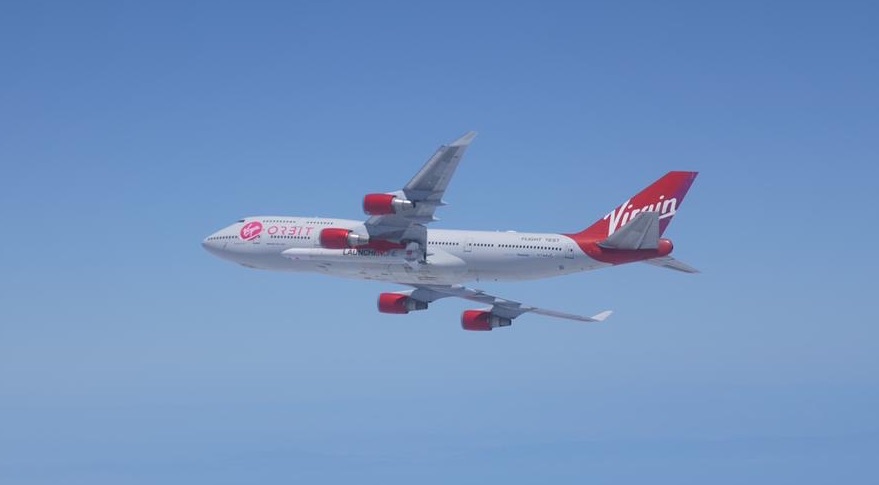Updated 5:00 p.m. Eastern.
WASHINGTON — Virgin Orbit’s LauncherOne failed to reach orbit in its first launch attempt May 25, with the mission “terminated” moments after the rocket’s release from its aircraft.
The company’s “Cosmic Girl” aircraft, a modified Boeing 747, took off from the Mojave Air and Space Port in California at 2:56 p.m. Eastern, after a launch attempt May 24 was scrubbed because of a faulty sensor on the rocket. After a 54-minute flight to the designated launch zone, near the Channel Islands off the Southern California coast, the plane released the LauncherOne rocket from its left wing.
However, Virgin Orbit tweeted moments later that while there was a “clean release” of the rocket from the aircraft, “the mission terminated shortly into the flight.” The company, which did not provide a live webcast of the launch but instead shared updates via social media, did not immediately provide many other details.
Company executives emphasized prior to the flight, including a media briefing May 23, that simply igniting the NewtonThree engine in the rocket’s first stage would be a key milestone for the flight. The company tweeted about an hour after the launch that the NewtonThree engine did ignite. “An anomaly then occurred early in first stage flight,” the company said.
Virgin Orbit acknowledged that achieving orbit on a first launch would be difficult, noting that, based on historical records, only about 50% of first launches of new vehicles are successful. The second LauncherOne rocket is nearing completion at the company’s factory, with several more in various stages of production.
LauncherOne started as a Virgin Galactic project, announced by company founder Richard Branson at the Farnborough International Airshow in July 2012. As originally conceived, LauncherOne would use the same WhiteKnightTwo plane built to serve as a carrier aircraft for its SpaceShipTwo suborbital vehicle.
In 2015, Virgin Galactic changed course and acquired a Boeing 747 from airline Virgin Atlantic; the name “Cosmic Girl” dates back to its use by the airline. Using a 747 allowed the company to increase the size, and payload capacity, of the rocket.
Virgin Galactic spun out the LauncherOne project into a separate company, Virgin Orbit, in March 2017, based in Long Beach, California. It later established a wholly-owned U.S.-incorporated subsidiary, VOX Space, to work with national security customers.
Virgin Orbit has gradually built up a manifest of commercial and government customers. Chief Executive Dan Hart said in a May 23 call with reporters that the total value of its manifest is in “the hundreds of millions” of dollars but did not give a specific figure. The company set a price of about $12 million a launch prior to entering service but he said that “pricing will follow the market as we get into full operations and we’ll adjust accordingly.”
LauncherOne is one of a growing number of small launch vehicles intended to provide dedicated launches of small satellites. While there are more than 100 such vehicles in various stages of development, by some estimates, Hart said he didn’t see nearly as much competition for his company.
“I don’t see it as very packed,” he said of the market in the pre-launch media call. “We’re differentiated in our air-launch capability, which gives us much, much higher flexibility, and even mobility.”
Most of those small launch vehicles that serve as potential competition to LauncherOne are still in earlier phases of development. “Launch is still a highly, highly needed commodity,” he said.
